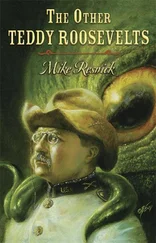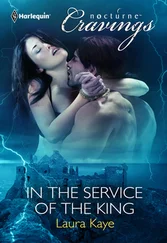“I don’t suppose it gives off a vibe or something?” I asked.
“Alas, nothing so self-explanatory,” he said.
“So how do you plan to determine whether that thing is mystical?”
“I’ve been thinking about that all the way home.”
“Oh! I thought you were thinking about . . .” I paused, not wanting to bring up Lily Yee’s name again. I concluded awkwardly, “Exactly that.”
He didn’t seem to notice, absorbed as he was in examining the dark fortune. “I have an idea . . . I once dealt with a matter which had features not dissimilar to our suspicions about the misfortune cookie.”
“In China?” I asked as I followed Max to the back of the bookstore.
“No, in Sicily. That strange episode was . . . oh, well over two hundred years ago, certainly. Goodness! Where do the years go? Nonetheless, I remember it well.”
I recalled that Max once told me he had been questioned by the Spanish Inquisition in Sicily, which had remained active there until the late eighteenth century. But I decided not to ask him any more questions tonight about memories he might not be keen to revisit.
We entered a little cul-de-sac at the back of the shop where there was a utility closet, a powder room, and a door marked PRIVATE. The door opened onto a narrow, creaky stairway that led down to the cellar.
At the top of the stairs, there was a burning torch stuck in a sconce on the wall. It emitted no smoke or heat, only light; it had been burning steadily ever since I had met Max, fueled by mystical power.
I descended the steep, narrow steps behind him as he said, “The situation in Sicily involved miniature replicas of body parts rather than a written fortune—”
“Ugh! That sounds gruesome.”
“Well, not necessarily. As with fortune cookies—which did not originate in China, by the way, though they have become a part of Chinese cuisine throughout America, whether the meal is humble or grand . . . But I digress.”
Now that he was focused on work, he was obviously feeling much more like his usual self. Whatever memories of Li Xiuying haunted him, they had retreated, and he was chatting with engaged enthusiasm as he reached the final step and entered his laboratory.
“Miniature replicas of body parts are normally part of a positive ritual in Sicily. And un like fortune cookies, whose origin was probably in twentieth-century California, the custom is very ancient.”
“What custom?” I asked.
“Sicilians leave these miniature replicas at the shrines of their favorite saints to entreat their blessings for health and their help with healing.”
“Ah-hah!” I said triumphantly, recognizing the nature of this custom. “Sympathetic magic.”
“Precisely.” Max sat down at his workbench and gestured for me to take a seat on a nearby stool. “But during a dark episode in the eighteenth century, an evil adversary started using such effigies to curse his enemies with ill health and injury.”
“It figures,” I said. “Someone always has to spoil a good thing.”
Like fortune cookies, for example. What evildoer, I wondered, whether mystical or mundane, had taken something so innocent, tasty, and fun, and decided to turn it into a menacing messenger of death?
Max continued, “And since these effigies of human body parts were so common in Sicily, it was essential to devise a means to determine whether any given replica was harmless or cursed.”
I looked around the laboratory and guessed, “So you’re going to use that method to analyze Benny’s fortune?”
“That is what I propose,” he said. “I have my notes from those days, and they contain the formula I used. I know it’s here somewhere . . .”
He rummaged around for a few minutes in the bookcase near his workbench, muttering to himself. After he found what he was looking for, he began gathering ingredients for his recipe from 200-plus years ago.
Max’s laboratory was cavernous, windowless, and shadowy. The thick stone walls were haphazardly covered with charts, plans, drawings, maps, lists, and notes, some of which were very old, and some of which had been added since my last visit down here. Bottles of powders, vials of potions, and bundles of dried plants jostled for space on cluttered shelves. Jars of herbs, spices, minerals, amulets, and neatly sorted varieties of claws and teeth sat on densely packed shelves and in dusty cabinets. There were antique weapons, some urns and boxes and vases, a scattering of old bones, and a Tibetan prayer bowl. And the enormous bookcase near where Max was sitting was packed to overflowing with many leather-bound volumes, as well as unbound manuscripts, scrolls, and modern notebooks.
I was always afraid to touch anything in here, so I sat with my hands folded, just watching Max work.
I had forgotten that fortune cookies were not actually Chinese in origin, but I now recalled my father telling us something of the sort many years ago, over one of our regular family meals of Chinese food. There seemed to be several stories about who had invented this combination of cookie and after-dinner entertainment; but regardless of which version was correct, few people disputed that fortune cookies had originated in America, as Max had asserted. According to my father’s account, fortune cookies were virtually unknown in China, despite their long association with Chinese food in the US.
This led me to a fresh thought. “Max, since fortune cookies aren’t originally Chinese, do you think Benny’s cookie might have been created by someone who’s not Chinese?”
He was peering into a small black cauldron that was full of newly measured and mixed ingredients, which he was simmering over a Bunsen burner on his workbench.
“It’s possible,” he said absently, and I realized this theory had already occurred to him. “I am not inclined to think so, since the fortune cookie has been closely associated with the Chinese in America since before Mr. Yee’s birth. But one should nonetheless keep an open mind about—Ah! It’s boiling.”
He reached for a jar with some golden-yellow powder in it, carefully measured a small scoop of the stuff, then tossed it into the boiling brew. A few moments later, the mixture emitted a deep vocal moan, so human-sounding that I hopped off my stool and gaped in alarm, ready to bolt.
“I’m sorry, Esther. I should have warned you,” Max said, noticing my anxiety. “Don’t worry. This is perfectly normal.”
“I wouldn’t say that, ” I muttered, climbing back onto my stool. As a cloud of yellow smoke wafted through the room, I gagged. “Blegh! What is that stench? ”
“It’s the sign that the potion is ready.” Max turned off the flame beneath the cauldron. Then he pulled Benny’s fortune out of his pocket and unsealed the plastic bag. Using a pair of tweezers, he extracted the black piece of paper and then held it over the smoking, stinking cauldron. “This is the part of the experiment I’m a little concerned about.”
“Oh?”
“The replicas I tested in Sicily were always made of solid materials, not paper.”
“Oh! You’re afraid that . . .”
“If this process doesn’t work, I may damage the fortune so much by immersing it in liquid that I will be unable to perform further experiments on it.”
“Hmm. I see your point, but I’m afraid I don’t have any alternative suggestions, Max.”
“Nor do I. So here we go.” He took a steadying breath, then dropped the fortune into the small cauldron.
There was a long moment of silence. Max’s face fell, and I feared the experiment had been a failure.
“Now what?” I asked. “Can we— Whoa! ”
The pot suddenly shuddered with life and shrieked with such ear-splitting horror that I fell off my stool in surprise.
Читать дальше











